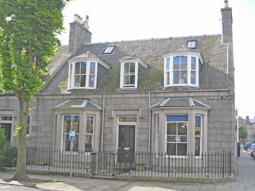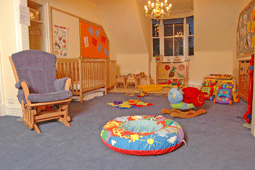Bruce Nursery
65 Osborne Pl, Aberdeen,
AB252BX
Telephone: 01224 646836

Pre-Birth to Three
Pre-Birth to Three: Positive Outcomes for Scotland's Children and Families is a document introduced by the Scottish Office, in association with Learning and Teaching Scotland to provide guidance for all those whose work involves caring for babies and young children. The four key features of Birth to Three are closely linked:
- Rights of the Child
- Relationships
- Responsive Care
- Respect
Our nursery staff work very closely with the Pre-Birth to Three document to provide the quality experiences children under 3 years old need: from feeding, cuddles and nappy changing to sensory experiences, outdoor play and music.
Baby Room and First Steps (0 – 2 Years)

The Baby Room and First Steps at The Bruce Nursery provides warmth, fun and security for children under 2 years old. The two rooms allow staff to provide the appropriate activities for your child’s age group and developmental stage.
It is important for children of this age to receive continuity of care between nursery and home therefore the nursery staff will ensure your child’s familiar routine is maintained.
The staff encourage the babies to freely explore and enjoy their play activities in a safe, relaxed environment allowing them to develop their confidence, independence and learning.
Under 2’s Activities

A variety of resources, activities and experiences on offer for children under 2 in line with the Birth to Three Document including:
Music, songs, rhymes, musical instruments, action songs (‘ring-a-rosies’, ‘this little piggy’) to develop language skills, physical development and expression through music.
- ‘Peek-a-boo’ and other simple interactive games to encourage social interaction.
- Walks and outdoor play for health, fitness, physical development and learning about ‘the world around us’.
- Treasure Baskets (baskets containing sensory items with (First Steps) different textures, sounds and smells).
- Extensive selection of books, stories and rhymes which helps to develop communication and language.
- Heuristic Play (play using everyday objects such as wooden spoons and pans which encourages curiosity and exploration and offers opportunities to categorise and compare)
- Sand play, water play, paint, play dough help develop creativity and is a sensory experience for young children.
Tiny Two’s and Stepping Stones (18 months to 3 Years)

In Tiny Two’s and Stepping Stones the Birth to Three Document is used by our nursery staff to provide the quality experiences your child needs at this stage as they begin to assert their independence and individuality.
Your child will be encouraged to access resources and exercise freedom of choice about the activities they wish to participate in.
Stimulating conversation, interactive play and learning to socialise, share and make friends is all part of the day.
The nursery staff will support your child through toilet training and developing independence at meal times in a secure, loving environment.
2 – 3 Years Activities

As well as many of the activities already mentioned in Baby Room and First Steps your child will also be able to participate in:
- Extensive selection of books, stories, poems and rhymes to encourage communication and language.
- Multi-cultural musical instruments, singing, action songs, musical games, music and movement.
- Daily opportunities for outdoor play for health, fitness and physical development.
- Introduction to computer skills through the supervised use of interactive educational programmes. The nursery also has a wide range of interactive toys and resources to further your child’s I.T knowledge.
- Sand play, water play to introduce early science concepts such as pouring, measuring, wet, dry, full, empty.
- Extensive opportunities for encouraging expressive development through painting, gluing and drawing using a variety of art materials.
- Play dough and clay are sensory experiences which encourage small motor skills in hands and fingers.
- Role play through dressing up, using puppets and ‘let’s pretend’ in the home corner. Children use role play to make sense of the world around them through acting out familiar experiences.
- Cooking and baking helps develop science knowledge such as measuring and weighing. Healthy eating habits are also encouraged.
- Planting and growing activities both in the garden and indoors to encourage the children to care for living things and gain knowledge of nature and the world around them.
- An extensive range of construction toys such as bricks and lego to encourage small motor skills in the fingers and hands.
Your Child’s Progress (Birth to Three)
The staff at The Bruce Nursery monitors and records each child’s progress. For children aged 0 to 3 years the following areas of development are observed by our staff:
- Physical Development - the most important area of physical development for very young children is to have their physical needs met: warmth, nutrition and health care. Children from birth to three will go through many stages of large physical development including: learning to roll over, sit up, crawl, walk, run and jump. Fine motor skills are also very important beginning with grasping rattles through to holding a pencil or crayon.
- Social Development – from birth children enjoy social interaction through cuddles, eye contact and facial expressions. Social development also involves your child becoming more independent in feeding, dressing, toileting and expressing their thoughts and feelings.
- Cognitive Development – very young children use all 5 senses to make discoveries about the world around them. Repetitive learning experiences are very important for children under 3 years old as their memory is still developing. Cognitive development includes: language development, recognition of colours, simple problem solving, basic counting skills and matching and sorting skills.
All children are treated as individuals. We recognise that each child will develop at their own pace therefore developmental stages are used as guidance only.